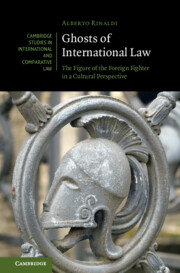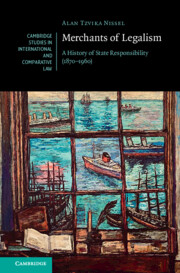Description:- The first global census bibliography of Hugo Grotius' De iure belli ac pacis
- Describes nearly one thousand surviving copies of the first nine editions of De iure belli ac pacis published between 1625 and 1650
- Examines annotations left by four centuries of readers
- Draws from previously unknown primary evidence to revise and expand our understanding of international law
The Unseen History of International Law locates and describes almost one thousand surviving copies of the first nine editions of Hugo Grotius' De iure belli ac pacis (IBP) published between 1625 and 1650. Meticulously reconstructing the publishing history of these first nine editions and cataloguing copies across hundreds of collections, The Unseen History provides fundamental data for reconstructing the impact of IBP across time and space. It also examines annotations that thousands of owners and readers have left in IBP copies over four centuries, offering original insights into the development of international law.
Grotius' De iure belli ac pacis has been commonly regarded as the foundation of modern international law since its first appearance in 1625. Most major international law scholars have engaged with IBP, often owning and richly annotating their own copies. At key moments - including the demise of the Holy Roman Empire, the fall of Napoleon, and the end of both world wars - IBP was reissued with new commentaries by multinational projects devoted to restarting the international order. Despite the enormous literature on IBP's reception and influence, we cannot fully understand its impact without uncovering the history of IBP as a physical object, with hundreds of thousands of unpublished annotations arguing or agreeing with the text, updating and adapting its contents.
Approaching Grotius' seminal work as a physical vehicle of the author's, the publishers', owners', and readers' engagement, The Unseen History radically expands and revises our understanding not only of IBP, but also of the academic discipline and lived practice of modern international law over the last four centuries. In addition to delving into the first nine editions' printing history, descriptive bibliography, and both Grotius' and the publishers' marketing and donation strategies, the book explores Grotius' subsequent impact on pro-slavery and abolitionist litigation as a case study of how the census' original findings can be applied to specific areas of reception.
Table of Contents:1:General Introduction
PART ONE: WRITING AND PRINTING IBP
2:1625. States and New Findings
3:1626. Pirated but Improved
4:1631. Large-Format and Long-Prepared
5:1632. The Janssonius Piracy
6:1632. The Blaeu Reprisal
7:1642. Annotata: Philemon and Posterity
8:1646. The First Posthumous Edition
9:1647. Re-issuing the 1631 Edition
10:1650. After Westphalia
PART TWO: OWNERS AND READERS OF THE IBP
11:Ownership Patterns of the 1625 IBP
12:Ownership Patterns of the 1626 IBP
13:Ownership Patterns of the 1631 IBP
14:Ownership Patterns of the 1632 Janssonius IBP
15:Ownership Patterns of the 1632 Blaeu IBP
16:Ownership Patterns of the 1642 IBP
17:Ownership Patterns of the 1646 IBP
18:Ownership Patterns of the 1647 IBP
19:Ownership Patterns of the 1650 IBP
20:Patterns in the 1625-1650 Editions
21:IBP and Censorship
22:Testing the Census: The Case of Slavery
23:Conclusion
PART THREE: THE CATALOGUE
24:The 1625 IBP Copies
25:The 1626 IBP Copies
26:The 1631 IBP Copies
27:The 1632 Janssonius IBP Copies
28:The 1632 Blaeu IBP Copies
29:The IBP 1642 IBP Copies
30:The 1646 IBP Copies
31:The 1647 IBP Copies
32:The 1650 IBP Copies
Appendix 1: Printer's Corrections in the 1631 IBP
Appendix 2: List of Co-Bound Copies by Edition
Bibliography
Authors:Mark Somos is Heisenberg Professor at the Max Planck Institute for Comparative Public Law and International Law, serving as Principal Investigator of the Grotius Census Project. He holds a PhD in Political Science from Harvard and a PhD in Law from Leiden. As a scholar, Mark taught at Sussex, Harvard, Yale, and Tufts universities. He has published six books and eighty articles and co-edits Grotiana and the book series History of European Political and Constitutional Thought. As a lawyer, Mark advises States, individuals, and NGOs, has served as Counsel in several ICJ cases, and has successfully represented victims in front of multiple UN Special Procedures.
Matthew Cleary is a Senior Research Fellow at the Max Planck Institute for Comparative Public Law and International Law where he studies legal history, having received his PhD in Law at Edinburgh Law School in 2023 on late medieval testamentary succession law. Prior to this, he studied in Canada, receiving a BA Specialization Honours in History from Laurentian University, and an MA in History from the University of Western Ontario. He has authored (or co-authored) multiple articles and book chapters, which have appeared in Forum Historiae Iuris, Grotiana, and Routledge, with several forthcoming publications.
Pablo Dufour is a research assistant at the Max Planck Institute for Comparative Public Law and International Law. He is currently pursuing an MSc in International Relations at the London School of Economics. He holds a BA from the University of Heidelberg, having spent the final year of his undergraduate studies at Sciences Po Paris.
Edward Jones Corredera is a Senior Research Fellow at the Max Planck Institute for Comparative Public Law and International Law, and is Assistant Lecturer at the Universidad Nacional de Educación a Distancia. He received his PhD in History from the University of Cambridge in 2019. His articles have appeared in the English Historical Review, the Journal of Early Modern History, and Global Intellectual History. He has been a Fellow at the Huntington Library and the Residencia de Estudiantes, and is a Fellow of the Royal Historical Society.
Emanuele Salerno is Senior Research Fellow at the Max Planck Institute for Comparative Public Law and International Law. He holds a PhD in Political Science from the University of Pisa and his current research is centred on theoretical and practical tools for supporting international peace and security in a historical comparative framework. Before joining the MPIL, he has contributed to the Italian research units of the international projects Natural Law 1625-1850 and Serica. He has published on the legal-political culture of the ruling class and cases of pragmatization of the law of nature and nations in eighteenth-century Tuscany.


